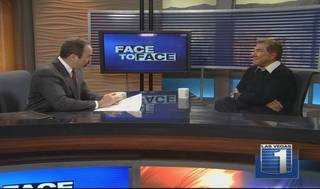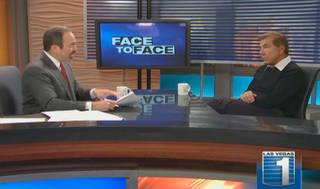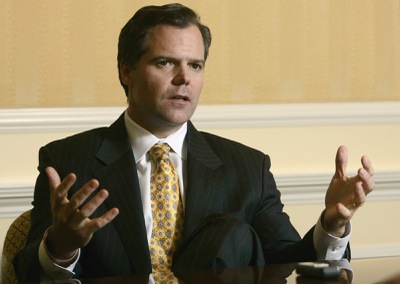Monday, April 13, 2009 | 2 a.m.
Sun Coverage
Sun Archives
- Dubai World wants assurance of CityCenter funding (4-10-2009)
- MGM Mirage stock surges on corporate financing news (4-6-09)
- MGM Mirage hires investment firm (4-4-09)
- Australian businessman weighing CityCenter investment (4-3-09)
- CityCenter contingency plan emerges; investor shows interest (3-28-09)
- CityCenter safe — for now (3-28-09)
- In a recession, a delay could be seen by rivals as a positive development (3-28-09)
- Shutdown would leave few other options for many in construction (3-28-09)
- A financial history of the CityCenter project (3-28-09)
- Letter sent to MGM Mirage employees from CEO James Murren (3-27-2009)
Steve Wynn, Part I

Viewing video requires the latest version of Adobe's Flash Player
Steve Wynn, Part II

Viewing video requires the latest version of Adobe's Flash Player
Face to Face: New CEO

Viewing video requires the latest version of Adobe's Flash Player
MGM Mirage CEO Jim Murren said last month he harbors no ill will toward people who think the company will fail.
“I have no illusions that this is going to be easy,” he said during a conference call with analysts last month. “We will take every question, we’ll take every criticism, and we’ll own it all.”
He added: “This is not without risk.”
Murren’s show of humility was balanced by a defense of the company’s track record before the recession and the skill of its management ranks. Still, his tone was startling.
Powerless against the economic forces threatening to drive their companies into bankruptcy court and speculators who have driven down the value of their companies’ stocks and bonds, more executives have replaced boasts with straight talk. Industry leaders’ evolving statements over the past 18 months have marked their realization that this recession has altered the business.
Major gaming companies’ earnings reports were strong heading into 2008, even as the housing market was crumbling. Evidence of a pullback in consumer spending surfaced on the balance sheets of local casino giants Station Casinos and Boyd Gaming in the fourth quarter of 2007.
Cracks in the local gambling economy spread to the Strip in early 2008. But because Las Vegas had rebounded from earlier downturns, many bosses thought the trouble would last just a few months.
In December 2007 Murren’s predecessor, Terry Lanni, became the first casino executive to publicly acknowledge that the banking crisis, seemingly confined to Wall Street, would hurt consumer spending. His prediction of a “difficult” 2008 came at a time when the spreading housing crisis was registering in Las Vegas, but the effect it would have on gaming wasn’t. Analysts were predicting a good year for tourism, in part because slower growth in gaming revenue had been offset by soaring nongaming revenue from attractions such as nightclubs and lounges. Room rates had jumped 10 percent in 2007, though visitor volume had risen 1 percent and convention attendance had dropped 2 percent, according to the Las Vegas Convention and Visitors Authority.
In fact, a key segment was already pulling back. Tourists who could least afford the luxury boom were visiting less frequently, in part because of the housing slump but also because they had been priced out of Las Vegas, where budget rooms were going for more than $150 a night.
Casinos operators who upgraded properties were OK with losing budget travelers because they were mobbed by wealthy and middle-income Americans with money to burn.
Now, they need all comers.
The humbling circumstances have led to humble statements by industry leaders, including one of its most flamboyant figures.
Steve Wynn bragged of his company’s relative financial stability heading into last year’s economic meltdown, but also warned of trouble ahead. He told investors in the fourth quarter of 2007: “It would be unsophisticated to think that Las Vegas is somehow a magical island unto itself, immune or isolated from the effects of the cities and the communities that serve it with its visitors.”
He has grown cautious in his commentary, telling investors in a February conference call: “I think that trying to give you guys rosy pictures and all that kind of jazz on these conference calls is a real disservice. I think what we ought to do is discuss what has been and be candid about what we think may be.
“If anything, we’ve learned that things have a way of taking negative turns rather quickly in the world today and I think we ought to be very conservative about what we say and more conservative about how we run the company,” Wynn said.
MGM Grand, a AAA Four Diamond resort, offers 5,044 rooms and suites.
MGM Grand features KÀ by Cirque du Soleil; Brad Garrett’s Comedy Club; and world-class entertainment at the Grand Garden Arena and Hollywood Theatre.
The resort offers signature restaurants by celebrity chefs including Tom Colicchio’s Craftsteak, Emeril Lagasse’s New Orleans Fish House, Wolfgang Puck’s Bar & Grill and Michelin three star and Forbes Five Star restaurant, Joël Robuchon.
As part of its ongoing “Grand Renovation,” MGM Grand has remodeled all rooms and suites in its main tower and is adding several new experiences to its lineup including Hakkasan Las Vegas Restaurant and Nightclub, a new upscale dining/nightlife concept (coming in April 2013).
MGM Grand also features a state-of-the-art, non-smoking conference center, the Grand Spa, Cristophe Salon, "CSI: The Experience" and an inviting pool complex featuring the tantalizing daylife of Wet Republic.
Upscale accommodations include The Mansion, an exclusive hotel within the hotel; the luxurious two-story SKYLOFTS at MGM Grand; and The Signature at MGM Grand, a luxury all-suite, non-gaming hotel located adjacent to the main resort.


Join the Discussion:
Check this out for a full explanation of our conversion to the LiveFyre commenting system and instructions on how to sign up for an account.
Full comments policy